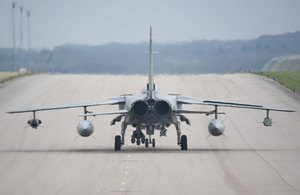Operations in Libya having a very real effect
Coalition operations against Colonel Gaddafi's forces are having a very real effect in protecting the city of Benghazi, Major General John Lorimer, the Chief of the Defence Staff's Strategic Communications Officer, said today, Tuesday 22 March 2011.

A Royal Air Force Tornado takes off from RAF Marham [Picture: Corporal Brad Hanson, Crown Copyright/MOD 2011]
General Lorimer was speaking at a media briefing in the MOD’s Main Building in London.
See Related Links to watch Gen Lorimer’s briefing on the Ministry of Defence’s YouTube channel.
The full briefing is as follows:
As we enter the fourth day of Operation ELLAMY, we are still conducting detailed assessment of the effects of military action against specific military targets. In any case, you will understand that at this time it would not be wise to disclose to Colonel Gaddafi precisely how well we believe we have performed in degrading his command and control network and his integrated air defence system.
But on a broader level, we have the best possible indication that this operation is having a very real effect; namely the protection of Benghazi from Colonel Gaddafi’s forces.
Last Friday, you will recall that regime troops were on the outskirts of Benghazi, the second largest city in Libya and home to more than 670,000 civilians. Colonel Gaddafi vowed that his men would be going from house to house, room to room, to burn out the opposition. Libyan troops were reportedly committing atrocities in outlying areas of the city.
The military intervention to enforce UNSCR [United Nations Security Council Resolution] 1973 has stopped that attack in its tracks. That is not to say that all threat to innocent life in and around Benghazi, or other cities for that matter, has been wholly removed. It has not. But the very fact that many of your news organisations are still able to have correspondents reporting freely in the heart of Benghazi is in itself testament to the immediate effect that this operation has had in blunting Colonel Gaddafi’s assault on his own people.
The number of countries conducting military operations to enforce the resolution continues to grow. US, French, Danish, Italian and British aircraft were yesterday joined on patrol over Libya by Spanish F-18s for the first time. The operation remains under US command. “You will be aware that a US aircraft crashed last night. Clearly this is a matter for the US authorities to comment on; my understanding is that both crew members are thankfully safe.
In my briefing yesterday, I mentioned that RAF Typhoon fighters had been forward based in Italy at Gioia del Colle. Yesterday afternoon, these aircraft mounted their first ever mission into hostile airspace, patrolling the no-fly zone under the control of an RAF Sentry AWACS [Airborne Warning and Control System] aircraft and supported by an RAF VC10 tanker.
Separately, a formation of Tornado GR4 aircraft again flew south from RAF Marham. Unlike their previous sorties on Saturday and Sunday, which were focused on Libyan military command and control facilities and air defence infrastructure, their mission yesterday was an armed reconnaissance sortie to protect directly the civilian population from attacks by Colonel Gaddafi’s ground forces.
With their state-of-the-art Litening targeting pods and a variety of precision-guided munitions, the Tornados are very well equipped to identify any emerging threats on the ground and deliver a dynamic and effective response.
Again, the GR4s were supported by VC10 and TriStar tankers, and, on completion of their mission, the Tornados joined the Typhoons forward based at Gioia del Colle.
“It would be appropriate at this point to note the significant logistic activity that is underway to support this operation, with RAF C-17 and C-130 transport aircraft very busy ensuring that the necessary personnel, equipment and stores are delivered swiftly to the various operating bases in the Mediterranean to maintain the operational tempo.
This work is obviously in addition to their long-standing tasks supporting operations in Afghanistan and elsewhere around the world.
On the maritime front, there are no major developments to report. Our Trafalgar Class submarine HMS Triumph remains stood by should any targets be identified which would best be prosecuted by her Tomahawk missiles. “HM Ships Westminster and Cumberland also remain on station. With their sophisticated surveillance suites, the ships are able to make a significant contribution to our monitoring of the situation along the Libyan coast, where most of the population centres of course lie.
They also have an important role in deterring the Libyan Navy from joining in Colonel Gaddafi’s attacks on the civilian population; before UNSCR 1973, their gunboats shelled a number of the coastal towns. But, as with the Libyan Air Force, we have seen a very marked reluctance on the part of their Navy to venture forth since the start of our enforcement action.
I began this brief by noting how the military enforcement of UNSCR 1973 had succeeded in halting Colonel Gaddafi’s assault on Benghazi. If anyone has any doubt as to the depths to which his forces are prepared to sink in quashing the opposition, one need only consider the mosque at Zawiya to the west of Tripoli.
This holy place was in an area where heavy fighting took place earlier in the month. After Colonel Gaddafi’s forces seized control of the town, the mosque was razed to the ground.
This is a sign of how far Colonel Gaddafi is prepared to go and why coalition operations to protect the civilian population are so necessary.